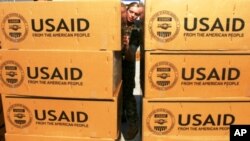In a rapidly shifting global landscape, U.S. agencies, such as the U.S. Agency for International Development, or USAID, must be nimble and responsive enough to adapt to, shape, and stay ahead of fast-moving trends, said U.S. Secretary of State Hillary Clinton in her introduction to the First Quadrennial Diplomacy and Development Review, or QDDR. It defines a program of reforms, said Secretary of State Clinton, "that will fundamentally change the way we do business."
The QDDR also made it clear that USAID will be the lead agency for the Presidential initiative on food security, known as Feed the Future. USAID administrator, Dr. Rajiv Shah, told reporter Christiane Amanpour in a recent interview that Feed the Future has a strong emphasis on nutrition and supporting local farmers so that countries can move away from a dependence on food aid. He also talked about engaging other partners, including the private sector, and the central role innovation and research are playing in this effort.
Feed the Future, a whole-of-government initiative launched by the Obama Administration, is aimed at helping countries produce more and higher quality local foods, said Dr. Shah. It's about finding ways to improve the nutrition of children under the age of two and pregnant women, so that they get better micronutrients and sufficient proteins. In doing so, said Dr. Shah, we are reinvesting in agriculture to essentially create the conditions that allow us to move away from food aid and allow countries to take care of their own people and their people's nutrition and welfare.
The United States has become the largest provider of resources for locally procured foods, Dr. Shah said. "We've gone from zero in our spending in that area to $250 million so that we can buy foods locally, buy the right foods, save money, and just as importantly, create the incentives for small farmers ... to improve their own agricultural production and really build a vibrant agricultural economy that helps move themselves out of poverty."
"During the '60s and '70s, we moved 300 million to 600 million people out of poverty and extreme hunger," said Dr. Shah. "We can do that again, and it can be cheap and efficient and a real partnership with other countries around the world and those we hope to serve."
USAID will be the lead agency for the Presidential initiative on food security, known as Feed the Future.




